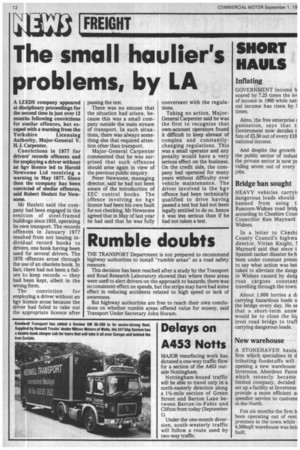The small haulier's roblems, by LA
Page 14

If you've noticed an error in this article please click here to report it so we can fix it.
A LEEDS company appeared at disciplinary proceedings for the second time in just over 12 months following convictions for similar offences, but escaped with a warning from the Yorkshire Licensing Authority, Major-General V. H. J. Carpenter.
Convictions in 1977 for drivers' records offences and for employing a driver without an hgv licence led to Harold Newsome Ltd receiving a warning in May 1977. Since then the company has been convicted of similar offences, said Robert Heslett for Newsome.
Mr Heslett said the company had been engaged in the erection of steel-framed buildings since 1935, operating its own transport. The records offences in January 1977 resulted from not issuing individual record books to drivers, one book having been used for several drivers. The 1978 offences arose through the use of an obsolete book. In fact, there had not been a failure to keep records — they had been kept, albeit in the wrong form.
The conviction for employing a driver without an hgv licence arose because the driver had failed to take out the appropriate licence after passing the test.
There was no excuse that the situation had arisen, because this was a small company outside the main stream of transport. In such situations, there was always something else that required attention other than transport.
Major-General Carpenter commented that he was surprised that such offences should arise again in view of the previous public enquiry.
Peter Newsome, managing director, said he had not been aware of the introduction of EEC control books. The offence involving no hgv licence had been his own fault for not checking. Mr Newsome agreed that in May of last year he had said that he was fully conversant with the regulations.
Taking no action, MajorGeneral Carpenter said he was the first to recognise that own-account operators found it difficult to keep abreast of complex and constantlychanging regulations. This was a small operator and any penalty would have a very serious effect on the business. On the credit side, the company had operated for many years without difficulty over vehicle maintenance. The driver involved in the hgv offence had been technically qualified to drive having passed a test but had not been legally entitled to do so, hence it was less serious than if he had not taken a test.




































































































